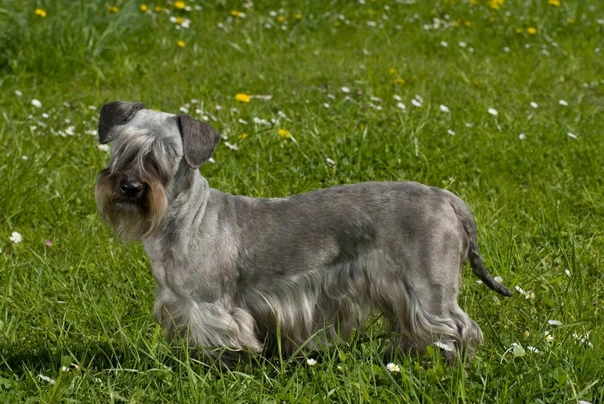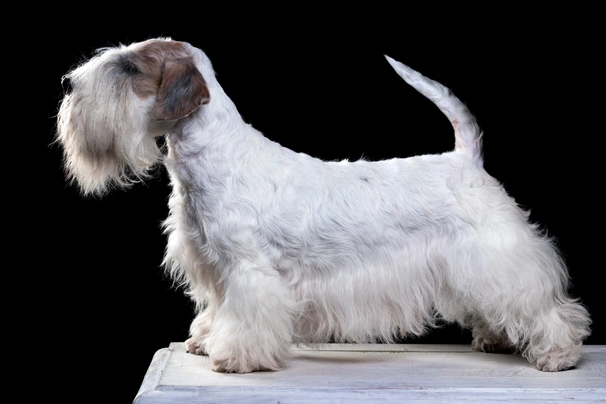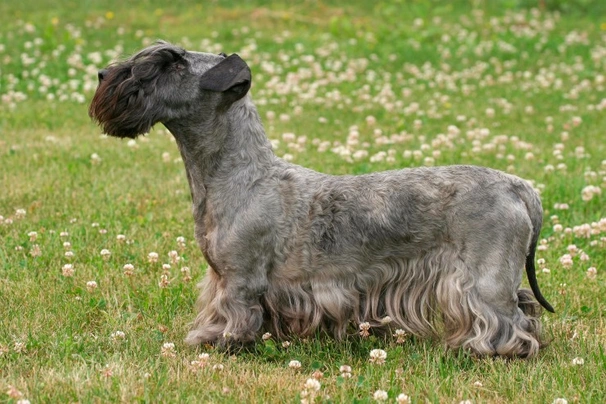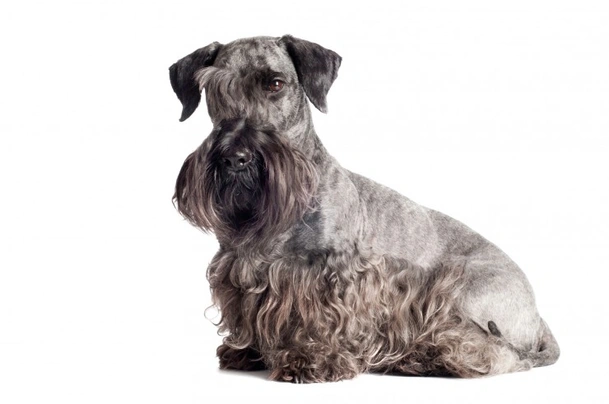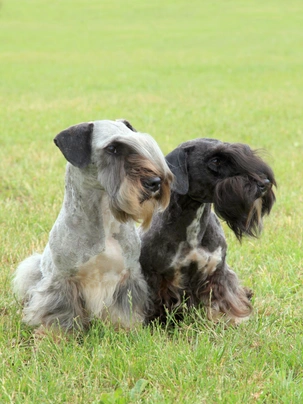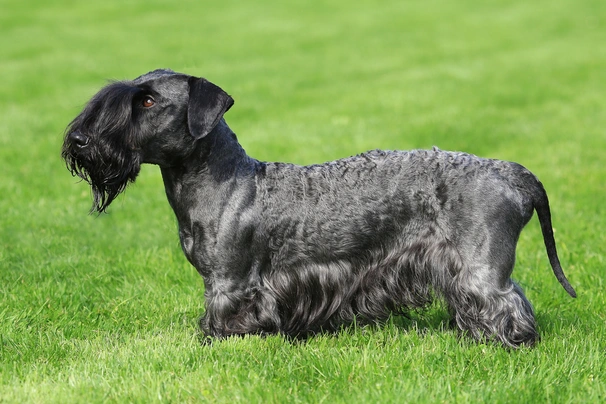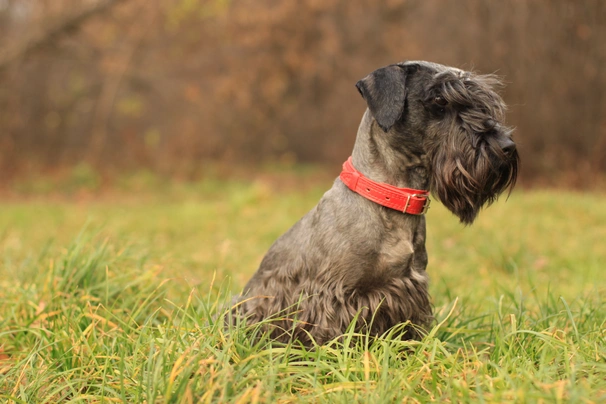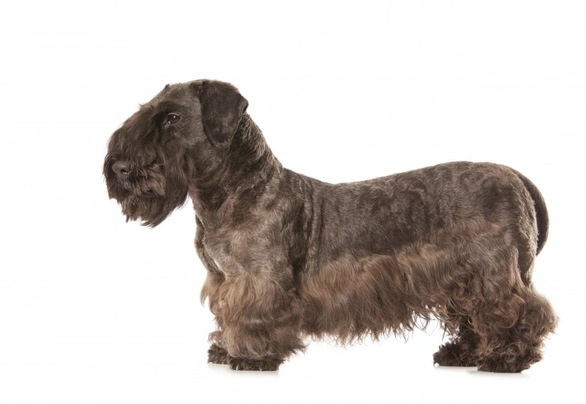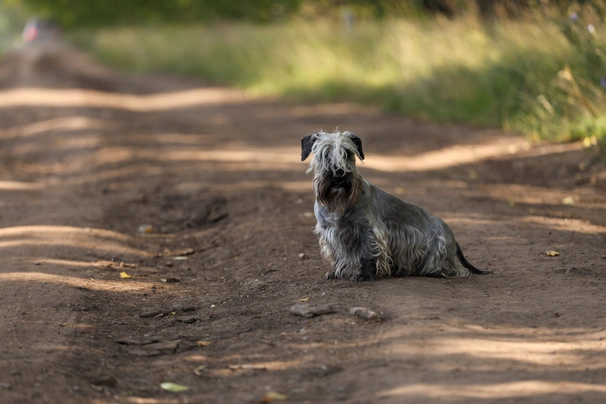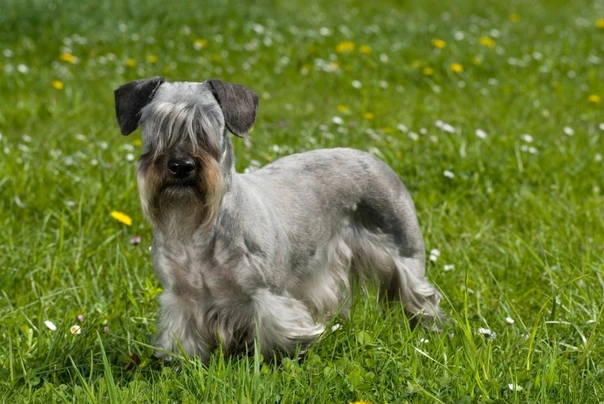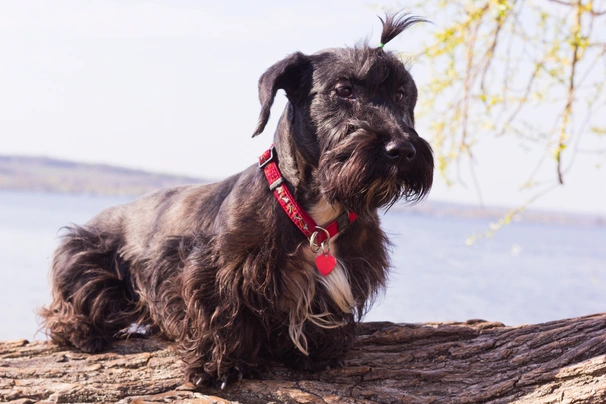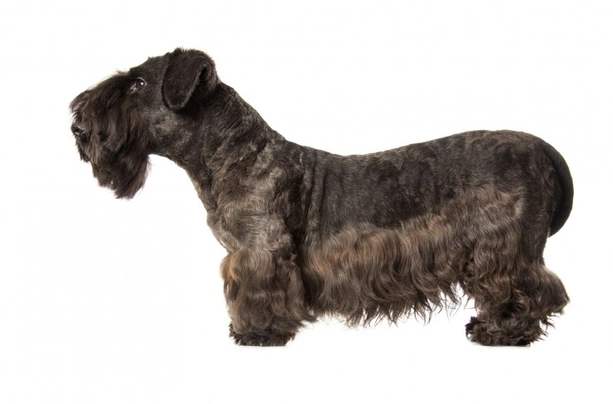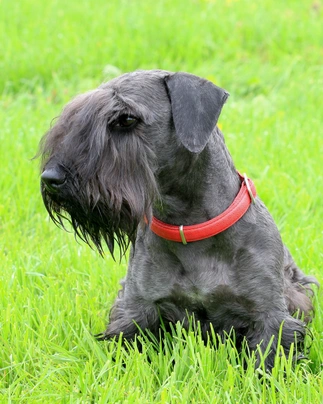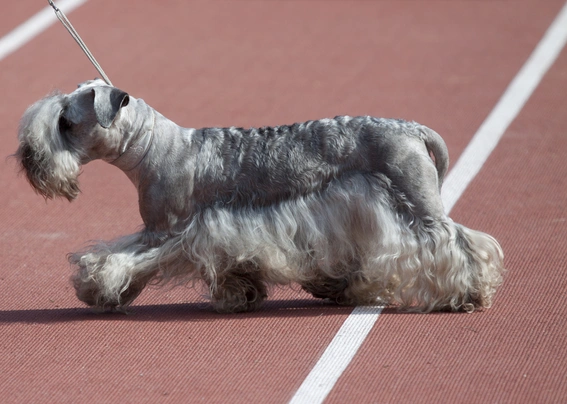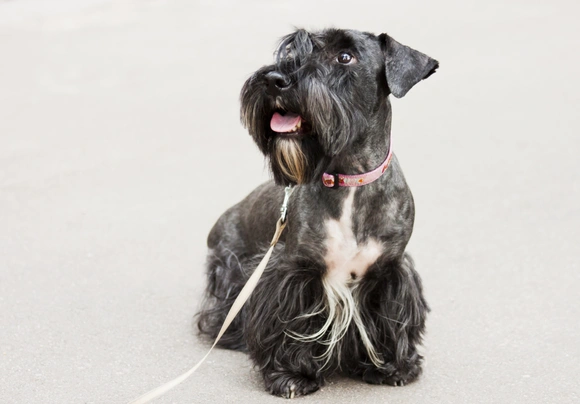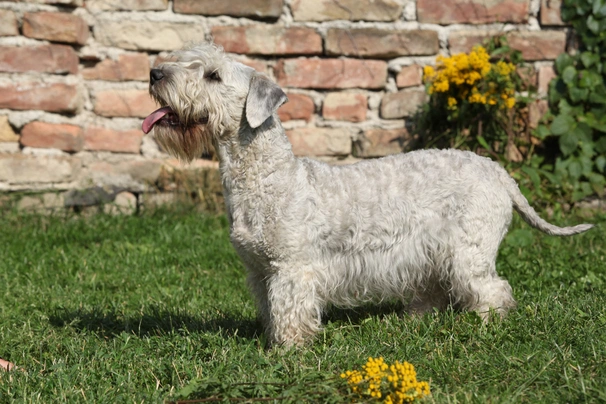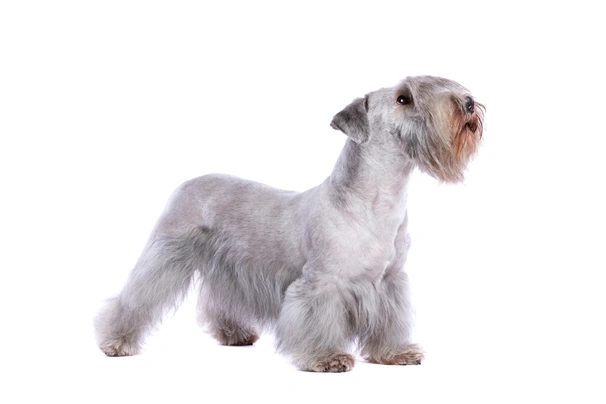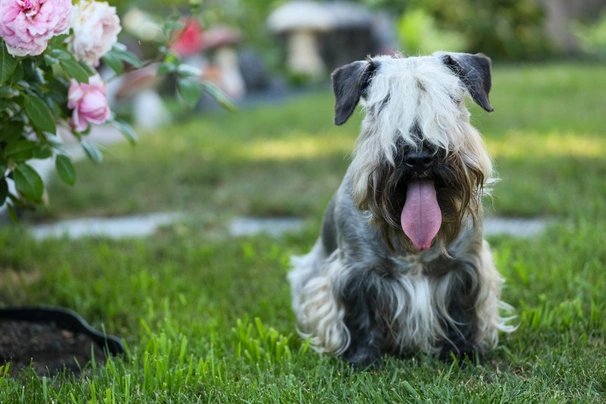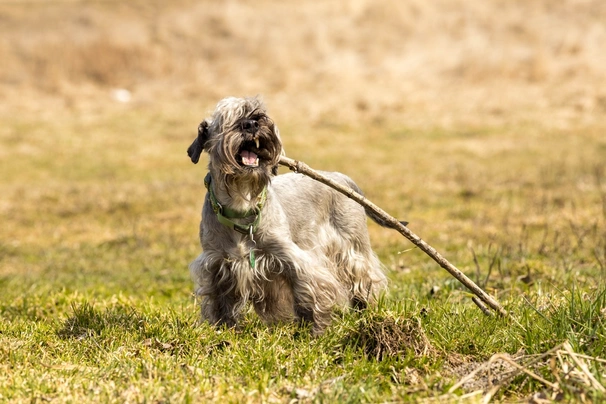Cesky Terrier
Pros
Cons
Introduction of the Cesky Terrier
Cesky Terriers are a relative newcomer to the UK with under five hundred of these charming little dogs in the country. They are the Czech Republic's national dog and for good reason because not only is the Cesky adorable looking they boast having affectionate loyal and kind natures too. They adore human company and are never happier than when they are in a family environment getting on well with children and other animals with the greatest of ease. With this said they are terriers and were bred to hunt which means that even in a home environment Cesky Terriers have a high prey drive.
They are the perfect choice for first time dog owners who want to share a home with an highly intelligent energetic canine companion that loves to have something to do. However finding well-bred Cesky Terrier puppies in the UK can prove challenging with long waiting lists because so few are bred and registered with the Kennel Club every year.
History of the Cesky Terrier
The Cesky Terrier was created and developed by a man called Frantisek Horak in Czechoslovakia during the last century where the breed is known as the Czech Terrier or Bohemian Terrier. The young Horak not only bred dogs but he bred ponies too which he started at the end of the Second World War. Later in life Horak studied to become a geneticist working at the Academy of Science in the capital of Prague. He earned the reputation of having wonderful examples of both Sealyham and Scottish Terriers which he used when hunting and set up kennels named Lovu Zdar which translated means “Successful Hunter”.
It was in 1932 that he acquired his first Scottish Terrier but found that the dog was very aggressive. Then in 1934 he became interested in the Sealyham Terrier and thought that by crossing the two breeds he would be able to develop a good hunting terrier that could work in a pack and “go to ground” when needed being small enough to do so. He crossed the two breeds in 1949 to create the first Cesky which he named Adam Lovu Zdar. Horak recorded all the bloodlines he used in his breeding programme over the following years. However his dog was shot by a hunter a year later by mistake which set Horak’s breeding programme back considerably but he continued using a Scottish Terrier called Scotch Rose. Six puppies were produced which were to be the foundation stock for the Cesky Terrier.
Horak’s end goal was to breed a terrier with a narrow chest a moderate size head and longer legs. He also wanted his terriers to have softer coats and a less aggressive temperament when they were not working which would make them that much easier to handle. He liked the dark coat of the Scottish Terrier and the drop ears of the Sealyham Terrier which he wanted to introduce into the mix. His terriers were bred to hunt rabbit duck fox and wild boar so they need to be courageous and have a lot of stamina. Horak also knew that easy maintenance coats were essential in his hunting dogs and as such a Cesky Terrier’s coat should never be hand-stripped but clipped instead. To make life easier Horak decided that his Cesky Terrier’s tail should not be docked unlike both of the parent breeds.
It was not until ten years later in 1956 that the Cesky Terrier was seen by the public and then 3 years later the Czechoslovakian Kennel Club recognised the breed. Over the next ten years the breed gained popularity more especially with the hunting fraternity throughout Europe. At one point Horak was given permission by the FCI to use another Sealyham Terrier so that new blood could be introduced to the breed and as such both in 1984 and then a year later this was achieved.
Cesky Terriers are highly prized in their native country but their popularity has also risen in other countries of the world which includes many Scandinavian countries. The breed appears on many postage stamps in artwork and in movies as well as on television. The breed is not only popular on the hunting field but in the showring too. They are renowned for their charming looks and adorable personalities with the Cesky Terrier having been officially recognised by The Kennel Club in 1990 and although their numbers are still low over here their popularity is rising albeit slowly. As such waiting lists tend to be long and well-bred puppies can often command a lot of money.
Interesting facts about the breed
- Is the Cesky Terrier a vulnerable breed? No although the breed is rare in the UK and breeders waiting lists tend to be long with well-bred puppies often commanding a lot of money
- The first Cesky Terrier imported to the UK was called Erb Lovu zdar a terrier that was bred in Czechoslovakia (as it was originally called) by František Horák
- The breed was granted Rare Breed Status by the Kennel Club in 2000
- One of the most influential Cesky Terriers over recent times is called Int. Ch Drahoušek Brusinka del Monte at Oneva
- A lot of Cesky Terriers are Kennel Club Good Citizen Dogs under the KC scheme
- Scottie Cramp is the only known inherited disorder to affect the breed
- A Cesky Terrier’s tail was never docked
- Cesky puppies are born black and it takes up to 2 years for their markings and final colour to grow through. With this said some puppies are born with brown coats – although this is very rare
Appearance of the Cesky Terrier
Height at the withers: Males 29 cm Females 27 cm
Average weight: Males 6 - 10 kg Females 6 - 10 kg
The Cesky Terrier is a short-legged and sturdy dog that boasts being longer than they are tall. Their defining physical feature has to their long heads which are adorned with a rather bushy beard thick moustache and bushy eyebrows. They have a distinct stop and their noses are coloured according to their coats as are the colour of their eyes which are medium in size. These little dogs always have a friendly affectionate look in them.
Their ears are moderately large and triangular in shape being set high and hanging down which dogs carry close to their cheeks. The Cesky Terrier has a strong jaw with a perfect scissor bite where their upper teeth neatly overlap their lower ones. They boast moderately long elegant yet strong necks which have a little loose skin around the throat.
Their shoulders are well laid back and forequarters are muscular with dogs boasting nice well-boned front legs. Their bodies are moderately long and their backs rise gently to nicely arched long broad and muscular loins. Briskets are cylindrical with dogs having well sprung ribs. The Cesky has a slightly tucked up belly. Their hindquarters are powerful with dogs having muscular upper thighs and shorter but strong lower thighs. Back legs are strong with dogs having well-padded and nicely arched feet with their front feet being larger than their back ones. Tails are long which dogs carry down when at rest with the very tip being slightly raised. However when alert or excited a Cesky carries their tail slightly higher.
When it comes to their coat the Cesky boasts having a slight wavy one with a silky sheen to it. Their eyebrows are prominent as are their beards and moustaches. Accepted breed colours for Kennel Club registration are as follows:
- Dark grey
- Grey
- Grey and tan
- Grey blue
- Light brown
- Silver
- Wheaten
It is worth noting that the accepted breed colours for Kennel Club registration can differ from those set out in the breed standard which are as follows:
- Grey/blue
- Light brown
Dogs can have yellow and grey marking on their cheeks on the underside of the muzzle neck breast and on the lower parts of their legs as well as under the tail. They can also have a white collar and white tip to the tail which is allowed under the Kennel Club breed standard. It is also worth noting that a dog’s skin on grey/blue coated dogs is grey and that on light brown coated dogs it is flesh coloured.
Gait/movement
When a Cesky Terrier moves they do so vigorously and briskly showing plenty of drive in their hindquarters. Their legs move parallel to each other both in the front and behind.
Faults
The Kennel Club frowns on any exaggerations or departures from the breed standard and would judge the faults on how much they affect a dog's overall health and wellbeing as well as their ability to perform.
Males should have both testicles fully descended into their scrotums and it is worth noting that a dog can be a little lighter or heavier as well as slightly taller or shorter than set out in the Kennel Club breed standard which is only given as a guideline.
Temperament of the Cesky Terrier
The Cesky Terrier is known to be a calm and placid character and would rarely show any sort of aggressive behaviour. They tend to be a little wary of strangers and like to keep their distance until they get to know someone. With this said Ceskies are good-natured terriers that adore human company which means they are great choice for people where one person usually stays at home when everyone else is out so they always have company.
They are not a good choice for people who spend most of the time out of the home leaving their dogs to their own devices which can lead to a Cesky developing separation anxiety. This is especially true if these terriers are not given enough daily exercise and mental stimulation which they really need to be truly happy well-rounded characters.
They are clever little dogs and they boast having all the usual terrier "traits" which means they love to chase anything that moves which includes smaller animals and pets. It would be a mistake to trust a Cesky with any pets because their prey drive would get the better of them which could end in a disaster. Puppies need to be well socialised from a young age which has to involve being introduced to as many new situations people and other animals as soon as they have been fully vaccinated for them to mature into well-rounded confident and well-behaved dogs.
Are they a good choice for first time owners?
The Cesky Terriers is a good choice for first time dog owners because they are so amenable and people-oriented loving nothing more than to please and to entertain their families. They are particularly good with young children and older people too although playtime can get a bit boisterous at times.
What about prey drive?
Although Cesky Terriers are social by nature they have a high prey drive and will happily chase anything that tries to run away from them or that they spot in the distance. As such care should always be taken as to where and when a Cesky can run off the lead more especially when there is livestock or wildlife close by.
What about playfulness?
Cesky Terriers have a very playful side to their natures and love to entertain and be entertained. They are known to be a little mischievous when the mood takes them and being so clever they quickly learn how to please and owner when they want to get their own way. They are known to love playing with children and are very tolerant around them.
What about adaptability?
Cesky Terriers are highly adaptable dogs and providing they are given enough daily physical exercise combined with as much mental stimulation to prevent boredom from setting in they are just as happy living in an apartment in town as they would be living in a house in the country.
What about separation anxiety?
Cesky Terriers thrive in a home environment and form strong ties with their families and dogs are never very happy when they find themselves left on their own for longer periods of time. They are better suited to people who either work from home or in households where one person stays at home when everyone else is out so they are never alone for any length of time which could see a dog suffering from separation anxiety. This can lead to them being destructive around the home which is a dog's way of relieving any stress they are feeling and a way to keep themselves entertained.
What about excessive barking?
Cesky Terriers are known to like the sound of their own voices a little too much which is something that needs to be gently nipped in the bud when a dog is still young being careful not to frighten them which could end up making a dog withdrawn and could just make them bark even more.
Do Cesky Terriers like water?
Some Cesky Terriers love swimming and will take to the water whenever they can more especially when the weather is hot. However if anyone who owns a dog that does not like water should never force them to go in because it would just end up scaring them. With this said care should always be taken when walking a Cesky off the lead anywhere near more dangerous watercourses just in case a dog decides to leap in and then needs rescuing because they cannot get out of the water on their own.
Are Cesky Terriers good watchdogs?
Cesky Terriers are natural watchdogs because they are always on the alert and ready to voice an opinion about something. However rarely would a dog show any sort of aggressive behaviour preferring to keep their distance stand their ground and bark.
Intelligence / Trainability of the Cesky Terrier
Ceskies are known to be intelligent and they are always eager and willing to please which in short means in the right hands and with the right amount of training these little terriers are easy to train. With this said they are known to have a bit of a stubborn streak in them so their training has to be firm yet fair and always consistent to achieve the best results.
They do not respond well to any sort of harsh correction nor do they like being treated in a heavy-handed way. They do however respond very well to positive reinforcement training techniques always remembering not to offer a Cesky too many unhealthy rewards which could lead to them putting on too much weight something they are very prone to do.
Like all puppies Cesky Terriers are incredibly cute when young and it is all too easy to spoil them when they first arrive in new homes. As soon as a puppy is nicely settled owners must start out as they mean to go on by laying down ground rules and boundaries so that a puppy understands what is expected of them. It helps establish a pecking order and who the alpha dog is in the household. The first commands a puppy should be taught are as follows:
- Come
- Sit
- Stay
- Heel
- Quiet
- Leave it
- Down
- Bed
Children and other
There is nothing a Cesky enjoys more than being part of the family and as such they get on well with children. However any interaction between younger kids and a dog has to be well supervised to make sure playtime does not get too boisterous which could end up with somebody getting hurt or frightened.
As long as a Cesky Terrier has been well socialised from a young age and introduced to as many other animals and pets as possible they generally get on well with them. However it should never be forgotten they are terriers and as such boast a pretty high prey drive which means care has to be taken when they are around any smaller pets and animals which includes cats.
Health of the Cesky Terrier
The average life expectancy of a Cesky Terrier is between 9 and 15 years when properly cared for and fed an appropriate good quality diet to suit their ages.
With so few Cesky Terriers being registered with The Kennel Club there is not a lot of information regarding health issues that may affect the breed. With this said there is one condition that seems to affect the Cesky which is a health issue known as Scottie Cramp. Luckily it is a pretty rare disorder that is seldom seen in many dogs including the Cesky Terrier. Other conditions that seem to affect the breed the most include the following:
- Hip dysplasia – dogs should be hip scored by a BVA registered vet or the Animal Health Trust (AHT)
- Primary lens luxation (PLL) – dogs must be eye tested
- Scottie Cramp – an inherited disorder
- Patella luxation
- Cancer
- Obesity
It is worth noting that the Kennel Club COI for the Cesky Terriers currently stands at 17.1%.
What about vaccinations?
Cesky puppies would have been given their initial vaccinations before being sold but it is up to their new owners to make sure they have their follow-up shots in a timely manner with the vaccination schedule for puppies being as follows:
- 10 -12 weeks old bearing in mind that a puppy would not have full protection straight away but would be fully protected 2 weeks after they have had their second vaccination
There has been a lot of discussion about the need for dogs to have boosters. As such it's best to talk to a vet before making a final decision on whether a dog should continue to have annual vaccinations which are known as boosters.
What about spaying and neutering?
A lot of vets these days recommend waiting until dogs are slightly older before spaying and neutering them which means they are more mature before undergoing the procedures. As such they advise neutering males and spaying females when they are between the ages of 6 to 9 months old and sometimes even when a dog is 12 months old.
Other vets recommend spaying and neutering dogs when they are 6 months old but never any earlier unless for medical reasons. With this said many breeds are different and it is always advisable to discuss things with a vet and then follow their advice on when a dog should be spayed or neutered.
What about obesity problems?
As with other breeds some Cesky Terriers gain weight after they have been spayed or neutered and it's important to keep an eye on a dog's waistline just in case they do. If a dog starts to put on weight it's important to adjust their daily calorie intake and to up the amount of exercise they are given bearing in mind that Cesky Terriers love their food and are prone to putting on too much weight anyway. Older dogs too are more prone to gaining weight and again it's essential they be fed and exercised accordingly because obesity can shorten a dog's life by several years. The reason being that it puts a lot of extra strain on a dog's internal organs including the heart which could prove fatal.
What about allergies?
Some Cesky Terriers are prone to suffering from allergies and it's important for a dog to see a vet sooner rather than later if one flares up. Allergies can be notoriously hard to clear up and finding the triggers can be challenging. With this said a vet would be able to make a dog with an allergy more comfortable while they try to find out the triggers which could include the following:
- Certain dog foods that contain high levels of grains and other cereal-type fillers
- Airborne pollens
- Dust mites
- Environment
- Flea and tick bites
- Chemicals found in everyday household cleaning products
Participating in health schemes
All responsible Cesky Terrier breeders would ensure that their stud dogs are tested for known hereditary and congenital health issues known to affect the breed by using the following schemes:
- Eye test for primary lens luxation (PLL)
- Hip dysplasia – dogs should be hip scored by a registered BVA vet
What about breed specific breeding restrictions?
Apart from the standard breeding restrictions that are in place for all Kennel Club registered breeds there are no other breed specific breeding restrictions in place for the Cesky Terrier.
What about Assured Breeder Requirements?
The Kennel Club strongly recommends that all breeders use the following test on stud dogs:
Caring for the Cesky Terrier
As with any other breed Ceskies need to be groomed on a regular basis to make sure their coats and skin are kept in top condition. They also need to be given regular daily exercise to ensure they remain fit and healthy. On top of this dogs need to be fed good quality food that meets all their nutritional needs throughout their lives.
Caring for a Cesky Terrier puppy
Cesky puppies are boisterous and full of life which means it's essential for homes and gardens to be puppy-proofed well in advance of their arrival. A responsible breeder would have well socialised their puppies which always leads to more outgoing confident and friendly dogs right from the word go. With this said any puppy is going to feel vulnerable when they leave their mother and littermates which must be taken into account. The longer a puppy can remain with their mother the better although it should never be for too long either.
It's best to pick a puppy up when people are going to be around for the first week or so which is the time needed for a puppy to settle in. Puppy-proofing the home and garden means putting away any tools and other implements that a boisterous puppy might injure themselves on. Electric wires and cables must be put out of their reach because puppies love chewing on things. Toxic plants should be removed from flowerbeds and the home too.
Puppies need to sleep a lot to grow and develop as they should which means setting up a quiet area that's not too out of the way means they can retreat to it when they want to nap and it's important not to disturb them when they are sleeping. It's also a good idea to keep "playtime" nice and calm inside the house and to have a more active "playtime" outside in the garden which means puppies quickly learn to be less boisterous when they are inside.
The documentation a breeder provides for a puppy must have all the details of their worming date and the product used as well as the information relating to their microchip. It is essential for puppies to be wormed again keeping to a schedule which is as follows:
- Puppies should be wormed at 6 months old
- They need to be wormed again when they are 8 months old
- Puppies should be wormed when they are 10 months old
- They need to be wormed when they are 12 months old
Things you'll need for your puppy
There are certain items that new owners need to already have in the home prior to bringing a new puppy home. It's often a good idea to restrict how much space a puppy plays in more especially when you can't keep an eye on what they get up to bearing in mind that puppies are often quite boisterous which means investing in puppy gates or a large enough playpen that allows a puppy the room to express themselves while keeping them safe too. The items needed are therefore as follows:
- Good quality puppy or baby gates to fit on doors
- A good well-made playpen that's large enough for a puppy to play in so they can really express themselves as puppies like to do
- Lots of well-made toys which must include good quality chews suitable for puppies to gnaw on bearing in mind that a puppy will start teething anything from when they are 3 to 8 months old
- Good quality feed and water bowls which ideally should be ceramic rather than plastic or metal
- A grooming glove
- A slicker brush or soft bristle brush
- Dog specific toothpaste and a toothbrush
- Scissors with rounded ends
- Nail clippers
- Puppy shampoo and conditioner which must be specifically formulated for use on dogs
- A well-made dog collar or harness
- A couple of strong dog leads
- A well-made dog bed that's not too small or too big
- A well-made dog crate for use in the car and in the home that's large enough for a puppy to move around in
- Baby blankets to put in your puppy's crate and in their beds for when they want to nap or go to sleep at night
Keeping the noise down
All puppies are sensitive to noise including Cesky Terrier puppies. It's important to keep the noise levels down when a new puppy arrives in the home. TVs and music should not be played too loud which could end up stressing a small puppy out which could result in them being withdrawn timid and shy.
Keeping vet appointments
As previously mentioned Cesky puppies would have been given their first vaccinations by the breeders but they must have their follow up shots which is up to their new owners to organise. The vaccination schedule for puppies is as follows:
- 10 -12 weeks old bearing in mind that a puppy would not have full protection straight away but would only be fully protected 2 weeks after they have had their second vaccination
When it comes to boosters it's best to discuss these with a vet because there is a lot of debate about whether a dog really needs them after a certain time. However if a dog ever needed to go into kennels their vaccinations would need to be fully up to date.
What about older Cesky Terriers when they reach their senior years?
Older Cesky Terriers need lots of special care because as they reach their golden years they are more at risk of developing certain health concerns. Physically a dog's muzzle may start to go grey but there will be other noticeable changes too which includes the following:
- Coats become coarser
- A loss of muscle tone
- They can either become overweight or underweight
- They have reduced strength and stamina
- Older dogs have difficulty regulating their body temperature
- They often develop arthritis
- Immune systems do not work as efficiently as they once did which means dogs are more susceptible to infections
- Older dogs change mentally too which means their response time tends to be slower as such they develop the following:
- They respond less to external stimuli due to impaired vision or hearing
- They tend to be a little pickier about their food
- They have a lower pain threshold
- Become intolerant of any change
- Often an older dog can feel disorientated
Living with a Cesky Terrier in their golden years means taking on a few more responsibilities but these are easily managed and should include looking at their diet the amount of exercise they are given how often their dog beds need changing and keeping an eye on the condition of their teeth.
Older dogs need to be fed a good quality diet that meets their needs at this stage of their lives all the while keeping a close eye on a dog's weight. A rough feeding guide for older dogs is as follows bearing in mind they should be fed highly digestible food that does not contain any additives:
- Protein content should be anything from 14 – 21%
- Fat content should be less than 10%
- Fibre content should be less than 4%
- Calcium content should be 0.5 – 0.8%
- Phosphorous content should be 0.4 – 0.7%
- Sodium content should be 0.2 – 0.4%
Older Cesky Terriers don't need the same amount of daily exercise as a younger dog but they still need the right amount of physical activity to maintain muscle tone and to prevent a dog from putting on too much weight. All dogs need access to fresh clean water and this is especially true of older dogs when they reach their golden years because they are more at risk of developing kidney disorders.
Grooming of the Cesky Terrier
Cesky Terriers boast quite high maintenance coats that need to be regularly groomed in order to keep things tidy and looking good. Their coats also need to be trimmed around 4 to 6 times a year which makes keeping on top of things that much easier between visits to a professional grooming parlour.
Ideally these little terriers need to brushed daily paying special attention to a dog's face their legs and areas of their body where the hair tends to be a lot longer. It's also important to trim the hair between a Cesky's pads on a regular basis to prevent it from balling up which can make walking uncomfortable for a dog.
It's also important to check a dog's ears on a regular basis and to clean them when necessary. If too much wax is allowed to build up in a dog's ears it can lead to a painful infection which can be hard to clear up. In short prevention is often easier than cure when it comes to ear infections.
Exercise of the Cesky Terrier
Ceskies are quite high energy little terriers and as such they need a minimum of an hour's exercise a day. A shorter walk in the morning would be fine but a longer more interesting one in the afternoon is a must. These dogs also like to be able to roam around a back garden as often as possible so they can really let off steam. However the fencing has to be extremely secure to keep these little terriers in because if they find a weakness in the fence they will soon escape out and get into all sorts of trouble.
With this said young Cesky puppies should not be given too much exercise because their joints and bones are still growing and too much pressure on them could result in causing a dog a few problems later on in their lives. They should not be allowed to jump up or off furniture nor should they be allowed to run up and down the stairs because this puts too much pressure on their still growing joints and limbs.
Feeding of the Cesky Terrier
If you get a Cesky puppy from a breeder they would give you a feeding schedule and it's important to stick to the same routine feeding the same puppy food to avoid any tummy upsets. You can change a puppy's diet but this needs to be done very gradually always making sure they don't develop any digestive upsets and if they do it's best to put them back on their original diet and to discuss things with the vet before attempting to change it again.
Older dogs are not known to be fussy or finicky eaters but this does not mean you can feed them a lower quality diet. It's best to feed a mature dog twice a day once in the morning and then again in the evening making sure it's good quality food that meets all their nutritional requirements. It's also important that dogs be given the right amount of exercise so they burn off any excess calories or they might gain too much weight which can lead to all sorts of health issues. Obesity can shorten a dog's life by several years so it's important to keep an eye on their waistline from the word go.
Feeding guide for a Cesky Terrier puppy
Puppies need to be fed a highly nutritious good quality diet for them to develop and grow as they should. As a rough guide a Cesky puppy can be fed the following amounts every day making sure their meals are evenly spread out throughout the day and it's best to feed them 3 or 4 times a day:
- 2 months old - 28g to 112g depending on a puppy's build
- 3 months old - 34g to 128g depending on a puppy's build
- 4 months old - 35g to 134g depending on a puppy's build
- 5 months old - 35g to 135g depending on a puppy's build
- 6 months old - 27g to 134g depending on a puppy's build
- 7 months old - 20g to 122g depending on a puppy's build
- 8 months old - 19g to 110g depending on a puppy's build
- 9 months old - 19g to 99g depending on a puppy's build
- 10 months old - 19g to 98g depending on a puppy's build
Once a puppy is 11 months old they can be fed adult dog food.
Feeding guide for an adult Cesky Terrier
Once fully mature an adult Cesky Terrier should be fed a good quality diet to ensure their continued good health. As a rough guide an adult dog can be fed the following amounts every day:
- Dogs weighing 6 kg can be fed 104g to 121g depending on activity
- Dogs weighing 8 kg can be fed 115g to 134g depending on activity
- Dogs weighing 9 kg can be fed 126g to 146g depending on activity
- Dogs weighing 10 kg can be fed 136g to 156g depending on activity
Cesky Terrier price
If you are looking to buy a Cesky you may have to go on a waiting list because not many puppies are registered with The Kennel Club every year and you would need to pay anything from £500 upwards for a well-bred pedigree puppy. The cost of insuring a male 3-year-old Cesky Terrier in northern England would be £24.09 a month for basic cover but for a lifetime policy this would set you back £52.18 a month (quote as of May 2018). When insurance companies calculate a pet's premium they factor in several things which includes where you live in the UK and a dog's age and whether they have been neutered or spayed amongst other things.
When it comes to food costs you need to buy the best quality food whether wet or dry to feed your dog throughout their lives making sure it suits the different stages of their lives. This would set you back between £20 - £30 a month. On top of this you would need to factor in veterinary costs if you want to share your home with a Cesky and this includes their initial vaccinations their annual boosters the cost of neutering or spaying your dog when the time is right and their yearly health checks all of which quickly adds up to over a £800 a year.
As a rough guide the average cost to keep and care for a Cesky Terrier would be between £50 to £80 a month depending on the level of insurance cover you opt to buy for your dog but this does not include the initial cost of buying a healthy well-bred Kennel Club registered pedigree Cesky Terrier puppy.
Buying advice
When visiting and buying any puppy or dog there are many important things to consider and questions to ask of the breeder/seller. You can read our generic puppy/dog advice here which includes making sure you see the puppy with its mother and to verify that the dog has been wormed and microchipped.
Cesky Terriers are quite rare in the UK which means that waiting lists tend to be long and well-bred puppies can often command a lot of money. As such with Cesky Terriers there is specific advice questions and protocols to follow when buying a puppy which are as follows:
- Beware of online scams and how to avoid them. You may see online and other adverts by scammers showing images of beautiful Cesky Terrierpuppies for sale at very low prices. However the sellers ask buyers for money up front before agreeing to deliver a puppy to a new home. Potential buyers should never buy a puppy unseen and should never pay a deposit or any other money online to a seller. You should always visit the pet at the sellers home to confirm they are genuine and make a note of their address.
- As previously touched upon finding Cesky Terrier puppies can prove challenging with few well-bred dogs being registered with the Kennel Club every year. As such some amateur breeders/people breed from a dam far too often so they can make a quick profit without caring for the welfare of the puppies their dam or the breed in general. Under Kennel Club rules a dam can only produce 4 litters and she must be between a certain age to do so. Anyone wishing to buy a puppy should think very carefully about who they purchase their puppy from and should always ask to see the relevant paperwork pertaining to a puppy's lineage their vaccinations and their microchipping.
- It is worth stressing that finding well-bred Cesky Terrier puppies in the UK is hard and that as previously mentioned waiting lists are long. Prospective owners must make sure that breeders have had both parent dogs health tested and that their puppies are Kennel Club registered.
